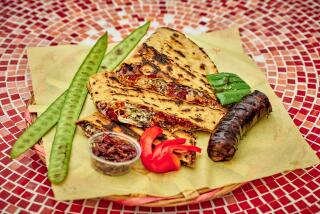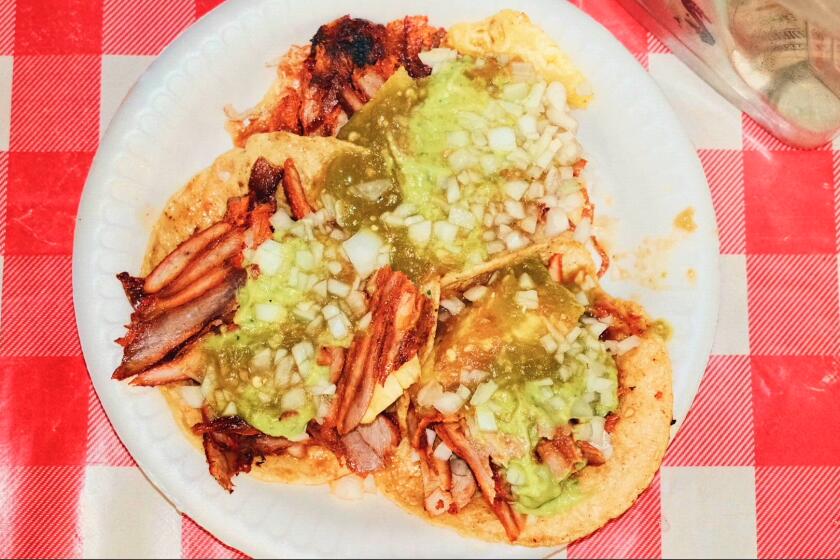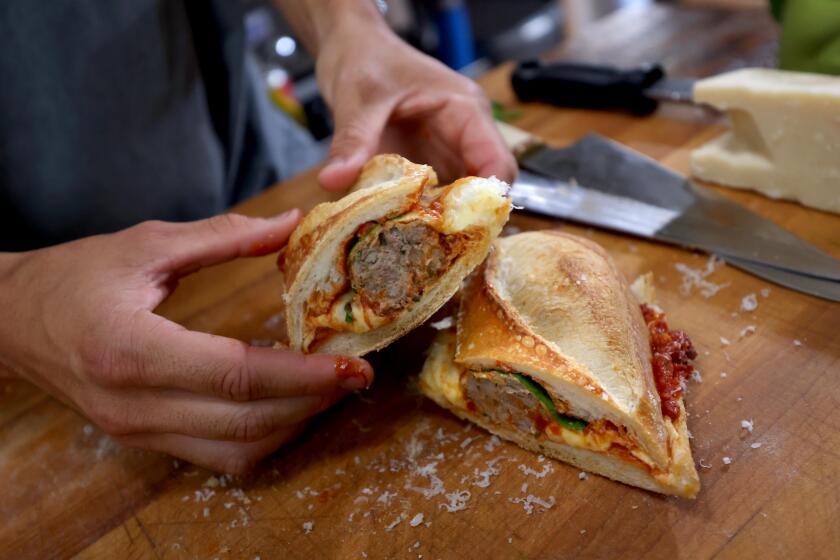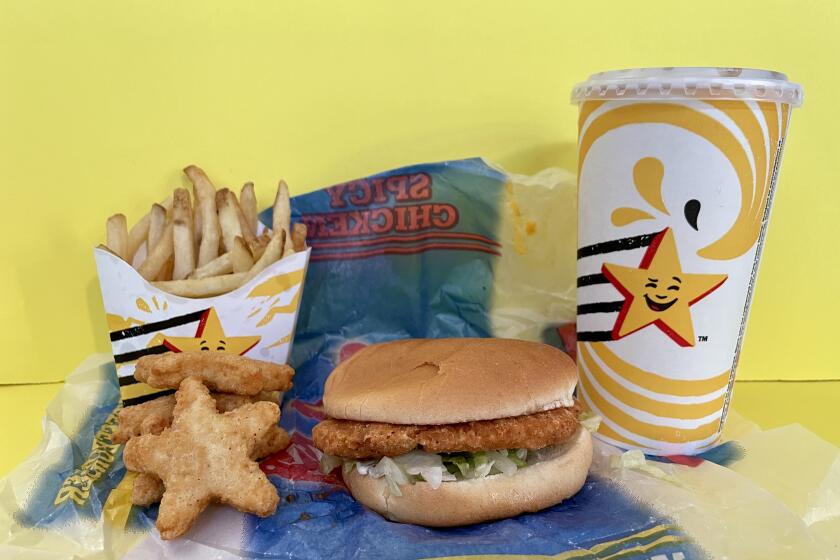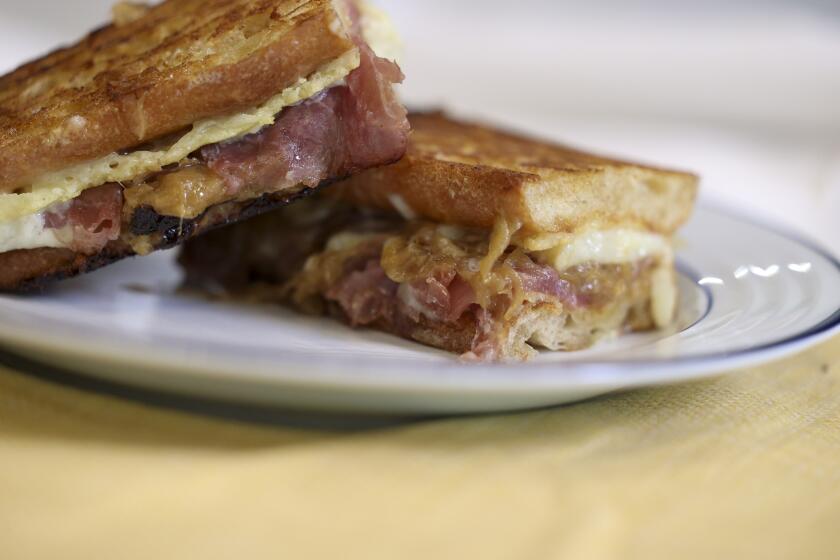When tortillas go head to head
HOW to choose among the seemingly endless array of tortillas available in Los Angeles? The Times tasting panel met last week to give it a try. Joining me on the panel were food editor Leslie Brenner, assistant food editor Betty Hallock, staff writer Charles Perry, test kitchen director Donna Deane and recipe tester Noelle Carter.
We tasted handmade corn tortillas purchased from area markets, tortillerías and taquerias, including Los 5 Puntos on César E. Chávez Avenue, El Parian on West Pico Boulevard, Olvera Street’s La Luz del Día and Tonny’s in Pasadena. Against these we pitted factory-made tortillas, including popular brands such as Guerrero’s, those made at the Graciana Tortilla Factory and Liborio Markets. We also included tortillas we made ourselves in the test kitchen, using fresh purchased masa from two sources, as well as masa we mixed ourselves from a bag of instant masa flour.
We tasted 18 different tortillas in all, and the results were fascinating.
The winners were those we made ourselves. Surprisingly, we liked the flavor and texture of the tortillas we made from masa flour even better than those we made from good-quality purchased masa. After that, the handmade tortillas from local purveyors won out over most factory-made tortillas. There were other surprises: Trader Joe’s handmade tortillas, made locally and delivered fresh daily, according to TJ’s director of national publicity Alison Mochizuki (she wouldn’t reveal where they came from), made the top 10, beating out many nonfranchise purveyors. And two machine-made brands fared very well too, ranking higher than many handmade tortillas.
Here are the top 10, listed in order of our preference:
Handmade, from instant masa flour. Great flavor and a wonderful texture, tender and not chalky. Maseca instant corn masa flour, available at Whole Foods, Pavilions and other grocery stores. About $3 for a 2-pound bag.
Handmade, from fresh Liborio Market masa. Nice corn aroma and a good chewy texture. 864 S. Vermont Ave., Los Angeles, (213) 386-1458; and five other Liborio locations. 99 cents per pound.
Handmade, using fresh La Adelita Food Co. masa. Fragrant tortillas with a mild but noticeable corn flavor, though some panelists noted a bitter finish. 317 S. Broadway, Los Angeles, (213) 628-0777, and three other La Adelita locations. 75 cents per pound.
Sabor a Mexico Taqueria and Grill handmade corn tortillas. Great texture and an almost sweet taste, pretty and slightly burnished in appearance; these tortillas scored almost as high as the handmade. 8940 National Blvd., Los Angeles, (310) 280-0380. $4.32 for one dozen.
La Parrilla Restaurant handmade corn tortillas. A little larger than some of the other handmade tortillas we tried, these had a terrific aroma, with good flavor and a pleasantly scorched appearance. 2126 E. César E. Chávez Ave., Boyle Heights, (323) 262-3434. $2.40 for one dozen.
La Azteca Tortillería handmade corn tortillas. Great corn flavor, although a little too dense for some panelists. 4538 E. César E. Chávez Ave., Los Angeles, (323) 262-5977. $1.75 for one dozen.
Trader Joe’s handmade corn tortillas. Excellent flavor, very rustic in appearance, a bit thinner than many others, which the panel liked. Available at all Trader Joe’s locations. $1.89 for one dozen.
Amapola Super Deli & Market handmade corn tortillas. These had the best texture of the handmade tortillas we tried, but were disappointing in terms of flavor, a bit bland. 7420 Florence Ave., Downey, (562) 776-0246; and 7223 S. Compton Ave., Los Angeles, (323) 587-7118. $2.25 for one dozen.
La Gloria corn tortillas from Whole Foods. We liked the dark yellow hue of these machine-made tortillas, which had a nice texture and good corn flavor. Available at select Whole Foods locations. $1.99 for one dozen.
La Adelita Food Co. corn tortillas. These machine-made tortillas, from the same company as the masa we tried and liked, had very good aroma and flavor. Available at all La Adelita Food Co. locations. The bargain of the bunch at $1.99 for three dozen.
— Amy Scattergood
--
Begin text of infobox
If you don’t already, why not make your own tortillas
MAKING your own tortillas is well worth the extra time — only as much time as it takes to make pancakes, and it’s just about as easy. All you need is masa (either prepared or mixed at home from instant masa flour), a tortilla press, two small plastic bags and a griddle orcomal.
A comal is a round or oval skillet, usually made of aluminum, sheet metal or cast iron, traditionally used in Mexican kitchens to cook tortillas. (Both comals and tortilla presses are available in Latino markets as well as through many online sources such as https://www.mexgrocer.com , https://www.mifiesta.com and https://www.cooking.com .)Although many cookbooks suggest using a nonstick sauté pan or cast-iron skillet, an aluminum comal works best, as it conducts heat faster than the nonstick but doesn’t retain it as long as the cast-iron skillet.
Simply mix up some masa, using masa flour, some water and a little salt (follow the directions on the package) — mix it with your hands until it’s smooth and pliant. (Or use prepared masa, which is available from many Latino markets.)
The dough should be soft and easy to work with; if it’s crumbly, just mix in a little more water. Then form the dough into balls, about 1 1/2 ounces each — or about the size of a golf ball. Cover them under plastic wrap so they don’t dry out.
Heat an ungreased comal or skillet over medium heat. While the comal is heating, place one of the plastic bags on the open tortilla press to keep the dough from sticking, then put one of the balls of masa on the bag, pressing it a little with your fingers to flatten it. Put the other bag on top of the dough, then press down firmly on the press. (The dough should be thin, about one-eighth of an inch.)
Open up the press and peel the top bag off. Then carefully pull the second bag off the flattened dough.
With your fingers, lay the dough flat onto the comal and cook for about 30 seconds, or until the dough loses its shine.
Flip the tortilla with a spatula and cook on the other side for about a minute, until it begins to brown a little. (If the tortilla begins to burn or colors too quickly, turn the heat down.) Flip again and cook for 15 seconds or so more, pushing down on the tortilla with your fingers or with a spatula so that it puffs up slightly, like a pita.
Once the tortilla has puffed and has a little color on both sides, remove from the comal and place in a basket lined with a cloth. Repeat, layering the cooked tortillas on top of one another and covering with the cloth to keep warm.
— Amy Scattergood
More to Read
Eat your way across L.A.
Get our weekly Tasting Notes newsletter for reviews, news and more.
You may occasionally receive promotional content from the Los Angeles Times.
